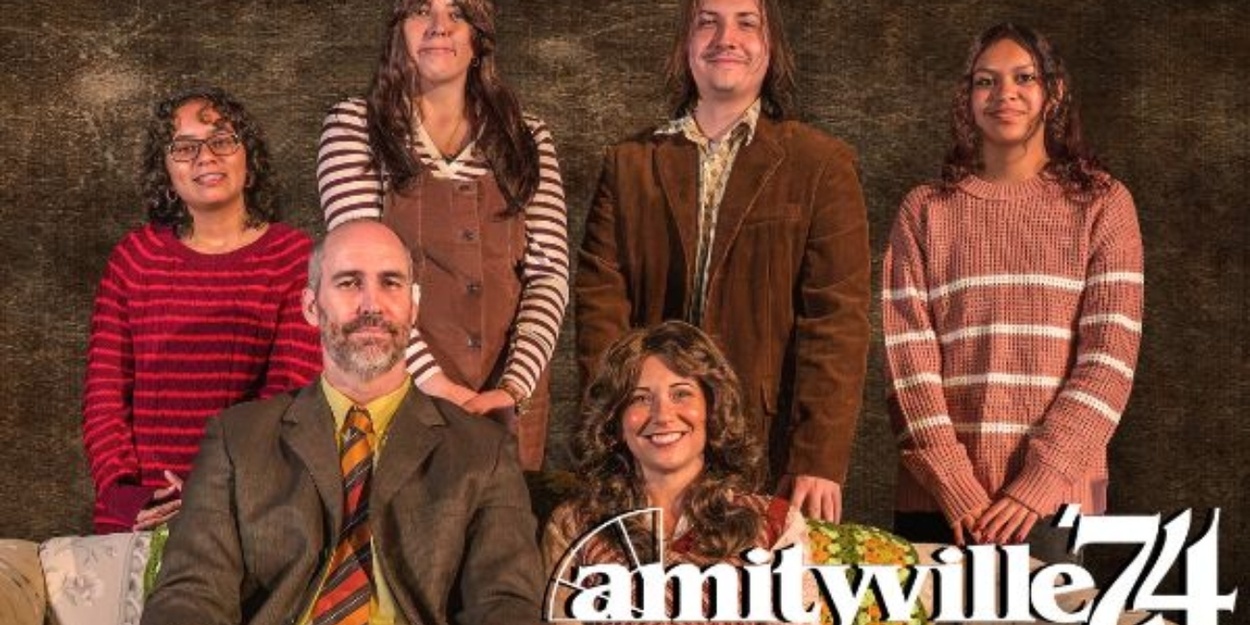Some performances entertain, and then there are performances that possess. Joshua Eberhart’s direction of Amityville 74 at Carrollwood Cultural Center is the latter—a dark, immersive descent into the fractured mind of Ronnie “Butch” DeFeo, where every light flicker and sound cue feels like a whisper from the abyss. It’s dark theatrical magic that leaves the audience breathless, haunted, and utterly transformed.
Donovan Dykes, in his first-ever stage role, delivers a performance that defies debut expectations. As 23-year-old Ronnie DeFeo, Dykes doesn’t merely portray a man unraveling—he becomes the unraveling. His twitching paranoia, moments of eerie stillness, and explosive vulnerability create a portrait of psychological collapse so raw it feels dangerous to watch. It’s a fearless, transformative performance that marks the arrival of a major new talent.
Paul Berg, as elder Ronnie, is equally astounding. His quiet intensity and strained conversation feel like echoes from a crypt—each word weighted with regret, rage, and something unnameable. Berg’s haunted stillness is the perfect counterpoint to Dykes’ volatility, and together they form a chilling duality: two versions of the same man, separated by time but bound by trauma.
Their story is framed by Peaches Brown, a curious interviewer, a woman who claims to be Ronnie’s cousin, determined to finish her deceased mother’s investigative work. Her presence is disarming at first—earnest, inquisitive, almost too polite. But as the layers peel back, she shocks the audience with a revelation that reframes everything. Her scenes with elder Ronnie take place above the masterfully crafted main set, perched like observers on a psychological balcony, bearing witness as his memories unravel below.
It’s a brilliant staging choice—Ronnie and the interviewer watching the past like a living autopsy, unable to intervene, yet unable to look away.
Anna Hoyt as Jodie begins as the overly friendly neighbor, all warmth and charm. But her transformation is insidious. With a smile that curdles the air, she twists Ronnie’s reality with terrifying precision. Her manipulation is subtle, seductive, and deeply unsettling—proof that horror doesn’t need fangs when it has charisma.
Kore Trotti, Camilia Palacios, Kamyla Ospino as Ronnie’s three sisters, each with their own voice and vulnerability, radiate love and loyalty even as their brother descends into madness. Their heartbreak is palpable, their devotion unwavering. Chelsea Smith as Ronnie’s dealer and girlfriend add another layer of tension—figures who feed his spiral while clinging to their own fractured truths. Melissa Mastromarchi as the drunken, abused mother is a portrait of broken love and desperate denial, while Jimmy Barringer as the domineering, abusive father casts a shadow so thick it feels like part of the set.
The ensemble cast of Mackley Fogarty and Samantha Sacasa slips between roles with such emotional precision that you forget they’re the same person. Each transformation feels complete, distinct, and emotionally true.
The technical design by Shelby Smotherman and Daniel Gentry is a character in its own right. Lights and sound don’t just support the story—they shape it. They scream when the actors whisper. They breathe when the house holds its breath. They sound hungry. And when the color red floods the windows, the room, it’s not just visual—it’s visceral. You suck your breath in, instinctively, as if the color itself might reach out and grab you.
Eberhart made the bold choice to forgo a curtain call—a decision that honors the gravity of the final moments. But let it be known: every performer, every technician, every soul behind Amityville 74 deserves a standing ovation.
This is not just a play. It’s a séance. And Carrollwood Cultural Center has summoned something utterly terrifying and unforgettable.
Reader Reviews


